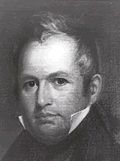| |||||||||||||||||
| |||||||||||||||||
 County Results Wolf: 50-60% 60-70% 70-80% 80-90% 90-100% Tie: 50% Ritner: 50-60% 60-70% | |||||||||||||||||
| |||||||||||||||||
The 1829 Pennsylvania gubernatorial election occurred on October 13, 1829. U.S. Representative George Wolf, a Democrat, defeated Anti-Masonic candidate Joseph Ritner to win the election. Delaware County would continuously vote against the democratic candidate for next 157 years until 1986.


